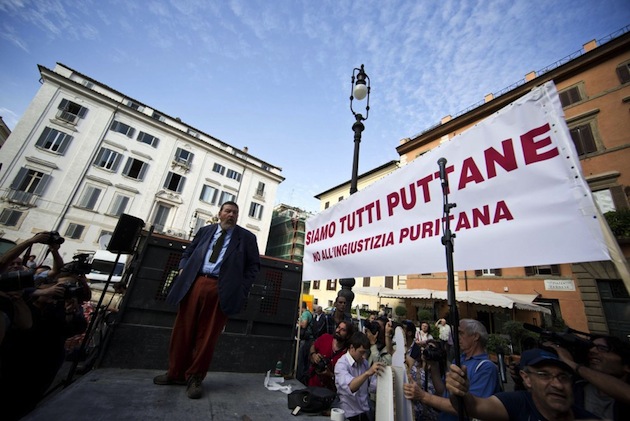 (Giuliano Ferrara standing in front of the "We Are All Whores" banner in Rome -- Ansa)
(Giuliano Ferrara standing in front of the "We Are All Whores" banner in Rome -- Ansa)
On June 24 former Italian Prime Minister Silvio Berlusconi was sentenced to seven years in jail for having paid a minor for sex. The day after, in the heart of Rome, a pro-Berlusconi demonstration took place under the unsettling banner: "We Are All Whores." Leading the demonstration was Giuliano Ferrara, editor of Il Foglio, a pro-Berlusconi newspaper. For the occasion, Ferrara recorded a video of himself applying lipstick, unintentionally giving us a metaphor for the horrifying state of the Italian political debate.
The banner was a final blow in an intense shift in the Italian consciousness. The impact of the Berlusconi era on the general impoverishment in which the country finds itself is beyond the darkest predictions. As if this were not enough, we now have to witness so lacking an intellectual scene as to have an even coherent voice of indignation. Both the press and the opposition have fallen into a vortex, the trap of responding to Berlusconi's dangerous political and cultural influence with sensational and raunchy accounts of his sexual escapades and public gaffes, in the process ultimately adopting and legitimizing the highly manipulative and populist language used by his sprawling TV empire.
It has been argued that the reasons for Berlusconi's constant rebirths are both legal and political. Indeed, it is crucial to note that the level of critical political thinking has been sinking deeper and deeper while the Italian judiciary system has become a swamp. Underscoring all of this, however, is the cultural void that Berlusconi's era brought about in Italy. The systematic demolition of intellectual engagement with politics has been the safety net, continually to rescue a dying political class and its leader.
In Italy, attempts at critical thinking invariably slide into an impoverished language that has been deliberately imposed. Italian used to be a language of multiplications, of Pindaric flights and creative metaphors. Its dialects gave birth to deep wisdom, and artists have thrived in its dynamic landscape. To the contrary, Berlusconi created a safety net by leaning on Italian stereotypes, bringing at the center of his dialectic obsolete Italian commonalities and giving them a new life; worse, he gave them credibility -- from sexuality and its obsession for objectified beauty to immigration. He created a new "Italianness" in which serious engagement and analysis are trivial and counterproductive. What counts are bites of knowledge, quickly and sporadically assembled. Italians developed a displacing fear of depth, and now they run away from it, literally scared of what is ultimately the most beautiful thing of all: to discover oneself as another person, a key element to any form of growth.
Superficiality became central to quenching any thirst for a larger understanding of sociopolitical shifts. Berlusconi brought the Italian inclination to hedonism to a whole new level -- from face-lifts to teaching Italians to love the camera "more than thyself." In Italy, the first reference to any person is about beauty, an empty neo-narcissism that is all-encompassing. Beauty plays its defining role, making its grand entrance in any conversation without invitation, compensating and self-sustained against all truths. From Berlusconi's thoughts on President Obama's beauty and "tan" to his condescending remark, "I gave you Carla," to former French President Sarkozy ("Carla" being the Italian ex top model Carla Bruni, Sarkozy's wife), Berlusconi brought to the center of his political rhetoric embarrassing casual banter that in turn established a new grey zone of acceptance.
What happens when beauty becomes the first thought in a collective consciousness? Beauty becomes an objectified, wordless presence -- in a country that once spoke in verses. It literally becomes an unavoidable currency. Since his arrival to power, Berlusconi filled the parliament with "ex-beauty queens." In the Italian consciousness, this is a disturbing seed that has become the ultimate justification for the behavior of a man approaching his eighties who is having paid sex with minors.
All of this lends cutting depth to filmmaker Pier Paolo Pasolini's 1974 prophecy: "Young Italians are risking a new form of inhumanity, an atrocious aphasia, a brutal absence of critical abilities, a factious passivity. I know, mine is certainly an apocalyptic vision." (Scritti Corsari, 1974)
Was it? It was not. Italy entered a phase of incapacity to invent new metaphors and real linguistic movements, both of which are crucial elements to raising awareness about the country's own paralyzed status. Italy became a country of cheap, ready-made answers, losing the necessity of questioning. It lost curiosity, that quintessential element. Curiosity implies care, and Italy lost its appetite for caring. Italians give in to a stereotypical racism: Any theft is always blamed on "a Romanian" who universally "cannot be trusted," while nothing is known on both a personal and a cultural level about Romanians; middle-aged men sink into obsessive masculine behavior and women justify their womanizing attitudes; while Berlusconi gets a face-lift to forget he is approaching his 80s, the younger generation lets mere convenience shape their lives and their thoughts. So here is a question that should be central: What happens when it is convenience that shapes our thoughts?
I've spent the last thirteen years of my life in a self-imposed exile floating between New York City and Asia, the deterioration of the Italian intellectual and political landscape was more than I could bear. Adorno wrote in Minima Moralia that "the value of a thought is measured by its distance from the continuity of the familiar." That distance is essential in contemporary Italy. The absence of that distance created a tired conformist behavior and a sleepy surrendering to easy stereotypes, both retrospectively fatal. From my floating world I dream of young Italians dismantling those easy bridges paved with ready-made common places. It is time to build your own raft to cross the swamp.
